Rambo: Last Blood (2019)
Directed by: Adrian Grunberg
Written by: Adriana Barraza, Matthew Cirulnick, Sergio Peris-Mencheta, Sylvester Stallone
Starring: Paz Vega, Sylvester Stallone
USA
IN CINEMAS NOW
RUNNING TIME: 89 mins
REVIEWED BY: Dr Lerena, Official HCF Critic
Eleven years after the events in Burma, Vietnam War veteran John Rambo is living in Bowie, Arizona in his deceased father’s horse ranch, which he manages with his old friend, Maria Beltran, and her granddaughter, Gabriela. He’s getting by, but only continual popping of pills seems to be keeping his PTSD at bay. A friend of Gabriela’s, Gizelle, has supposedly found Gizelle’s biological father, Miguel, in Mexico, so, against Rambo and Maria’s wishes, Gabriela goes there with Gizelle to see him. There, she’s drugged and kidnapped by members of a Mexican cartel. Rambo travels to Mexico to find and rescue her, but he doesn’t seem to be aware of what he’s up against, and who’s this mysterious woman who keeps following him?….
This may sound to some to be far more than the film requires, but you never know, you may end up getting two reviews from me of Rambo: Last Blood, as it’s come to light that there are two distinct versions of it around, one running 101 minutes and one running 89 minutes, and Lionsgate have rather randomly chosen which countries are deserving of the full enchilada and which ones aren’t. Surprise surprise, both the UK and US have been lumbered with the shorter cut. Even if not armed with that knowledge, one can notice a few awkward edits in a couple of dialogue scenes which look like they are cut away from before they’ve properly ended [though of course the latter is nothing new these days], but the main difference is that the longer edit contains a lengthy new opening scene where Rambo is attempting to rescue three hikers caught in a flood. Whether you think opening the film so dramatically is a good idea or not, the suggestion that Rambo has been doing this sort of thing often in his old age rather than still killing people or just doing nothing would probably add an extra dimension to both the story and the character from the sounds of it. I’m not sure whether Lionsgate did the editing down or whether it was Sylvester Stallone himself, seeing as he put together an alternate [though in this case longer] version of Rambo after it came out. But it’s pretty ridiculous really, and irritating to know that we haven’t got the complete film to judge – though no doubt we will on Blu-ray.
My heart sank when the news broke that they were making another Rambo film, because 2008’s Rambo seemed to bring sufficient closure to the character. Of course I felt similarly when Creed was announced, Rocky Balboa having said goodbye to Rocky in perfect fashion with that wave to the audience, though Creed turned out to be rather good and continued Rocky’s story well. I was happy to admit that I was wrong. And – you know what? – I’m happy to admit that I was wrong again, if maybe to not a great a degree. Last Blood has not much of a good reception from the majority of film writers, and only skimming three other reviews for a few seconds told me what the two main complaints are, one of which is totally ridiculous though sadly prevalent these days – but I will get to all that later. But then Rambo had never really had a good ride from the critics, even though John Rambo is undoubtedly second only to Rocky in Iconic Stallone Characters – in fact I remember well the period in the mid ‘8os where the soldier was even more popular [at least with audiences] and certainly more talked about than the boxer. This last [I hope] outing for Rambo feels rather different from the others, even the first one. It’s a much smaller-scale affair than we’ve come to expect, though this kind of makes sense. It would be stupid to still have the now-73 year old [well, we’re not told how old Rambo is but Stallone is 73 so let’s presume Rambo is of a similar age] still going to war and defeating armies. Even Rambo toned down the super-heroics, and this admirably continues the trend further. I can see some Rambo fans being disappointed by a film which has a largely urban backdrop and which doesn’t have the man mowing down bad guys by the bucket load. But most of what we have here does seem appropriate. Sly has gone and done it again and brought back Rambo in a way that makes it an appropriate farewell to the character. The resulting film is gratifyingly vicious, commendably raw, yet surprisingly emotional and bravely bleak – and even, dare I say it? – quite intelligent in parts, at least more so than one would probably have a right to expect.
So in the cut we have in the UK we first rejoin Rambo having found some measure of piece living on this ranch with two women in scenes that have a real Western feel to them. Well, I say “some measure of piece”, he’s still having to knock back to pills to keep his demons at bay. A myth regarding the Rambo series is the supposed lack of character development which admittedly is not as obvious as the Rocky series, but throughout the first four installments, there has certainly been progressive emotional and psychological development with little glimpses of the changes Rambo is undergoing. And this is even if, when you come down to it, the character is, at least until this episode, symbolically contradictory, an example of how war can damage while also being the perfect soldier. But here, we are at least allowed to see Rambo among a family he loves and treasures immensely, and never has his humanity and purity of spirit been better articulated. As a result, he’s given the opportunity to be far more verbal and expressive than before, and Stallone shows what a strong actor he can really be, delivering a beautifully moderated performance full of vulnerability, pain and nobility – and of course that intensity that you know will eventually come along, only said intensity is even stronger than normal, you can truly feel the anger and sadness. But it’s quite a while before you see this, because Last Blood is not a full-on action fest. While still paced tightly by director Adrian Grunberg, it concentrates more on its plot [which is undoubtedly simple but seeing as this is a Rambo film why should it be any more than that?] progressing as it builds up to its climactic orgy of blood and guts. As I said before, it would be really dumb having its geriatric hero wasting bad guys left and centre all throughout the film.
So Rambo seems to be leading this reasonably decent life despite feeling the need to have dug an underground network of tunnels by his house and fastidiously checking them every evening. He even lets Gabriella, who’s basically his adopted granddaughter in everything but name, hold a party in said tunnels. She’s supposedly off to college the next morning, but receives a phone call from her old friend Gizelle who’s found her father. Against Rambo and Maria’s wishes, Gabriela secretly drives to Mexico to ask why Miguel had abandoned her and her mother years ago. We already dislike Miguel for being told that he beat Gabriela’s mother and walked out on her when she was dying of cancer. And now we hate him even more when he reveals to Gabriella that he never really cared for Gabriela or her mother. Her friend Gizelle takes an understandably heartbroken Gabriela to a local club, but Gabriela is drugged and awakes chained to a wall along with some other women being trained to be sex slaves and then sold. Maria informs Rambo of Gabriela’s disappearance, so Rambo travels to Mexico and interrogates both Miguel and Gizelle about Gabriela’s whereabouts. She was last seen talking to a guy named El Flaco, so Rambo forces him in an exceedingly brutal manner to lead him to Gabriela’s location – but he’s clearly lost his edge as he lets himself by surprised and surrounded by loads of thugs, and then pays for it, while also being told that the cartel will mistreat Gabriela further due to Rambo’s actions. Rambo seems a bit out of his depth here, and, without the point being laboured, we’re given the idea that his actions make things worse. Fortunately an “independent journalist” named Carmen Delgado has been following Rambo and is there to help him out – and yes, she’s a thinly written character who doesn’t have much point to her at all.
Of course much of this does seem like Taken with a few variations, but early drafts of this script were written before that film [one of them becoming Homefront], and there are some important details that make this film a tad more disturbing and even poignant if undeniably less fun. For example, at one point Rambo bursts into a brothel, bashes in some faces and other body parts with a hammer and tells the girls there to flee – but they don’t and are next seen with all the bad guys again. Nothing has changed for them. And there’s one a plot twist that could be the saddest moment in all of Stallone’s films. The ferocity of Rambo in the final act is matched by the extreme nature of the graphic bloodshed that we see. Heads blown off, hearts are ripped out, this Rambo pours loads of bullets into people that are obviously already dead. Things didn’t need to be as extreme, but it really adds to the cathartic nature and the sense of Rambo’s anger. Unfortunately it seems to be nearly all CGI that’s used; CG blood rarely looks right, and there’s one godawful shot of a face being sliced into three. In an ideal world this is the kind of thing that critics would complain about, but no. And yet this film is not racist or xenophobic, not a “Trumpian revenge fantasy” – the latter being hardly likely seeing as the script was written way before Donald Trump got elected. It just has lots of Mexican bad guys and isn’t making a social/political point at all. We want Rambo to rain hell on these scum because they’re kidnappers, rapists, murderers and members of organised crime, not because they’re Mexicans. If anything the portrayal of the cartels in this movie is rather tame. But then some critics even criticised something like Sicario 2 for having racist stereotypes, the same writers that were presumably also ignorant of the fact that Mexico still has a huge problem with drug cartels. It’s very sinister the way all of Hollywood is supposed to follow one political ideology and the way that the critics – or should I say the publications that employ them – are obliged to follow them like sheep, especially right now when there’s a real fear that Trump will get re-elected. Fortunately audiences often ignore such blatant agenda pushing, and long may that continue.
Last Blood only really skims the surface of its weightier themes. And even I was initially unsatisfied by the conclusion. First Blood began with Rambo walking up a dirt road to the home of one of his former platoon mates, clearly looking to belong somewhere, because he’s having a rough time of it by himself. But he’s told that Delmar Berry has died, so he’s sent on his way. Rambo ends with a much older Rambo again walking down a dirt road to his father’s farm, which makes sense. If he were to belong anywhere it’d be there. Rambo trying to find if he has a place in the world is a running element of the entire series, so him walking up to a place with his literal name on it is a pretty explicit way of implying that he’s found it. Last Blood sort of takes a dump all over that by destroying Rambo’s world, and not leaving us with much sense of closure at the end. There’s a little bit, but will any viewer be left with the idea that Rambo will be at peace now? If anything he’ll be back to drifting and threatening to explode again. It’s a pretty downbeat, negative conclusion, but it’s a daring and believable one. After all, we then get a more sentimental finale as clips from all the films end with Rambo riding off into the sunset. Which ending would you prefer? It makes you think a little. But by god why didn’t Rambo waste that piece of **** Miguel?

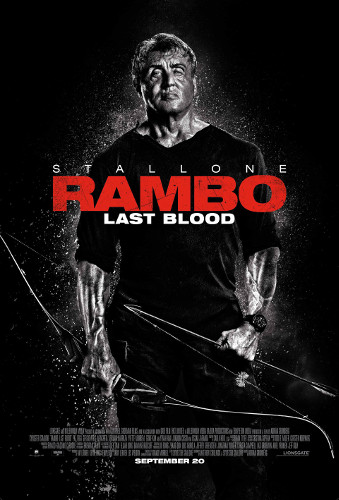
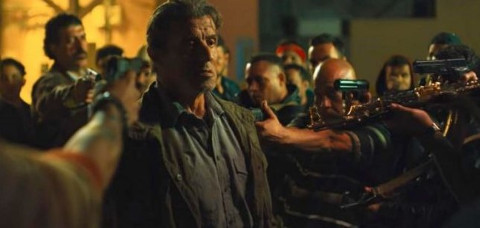
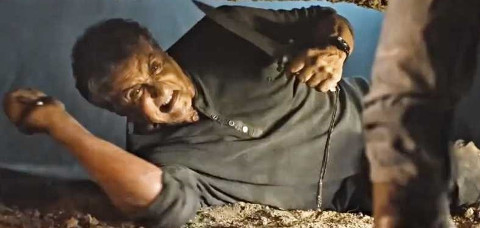




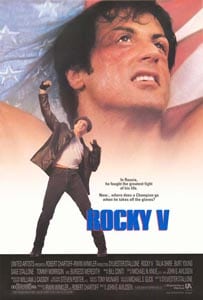
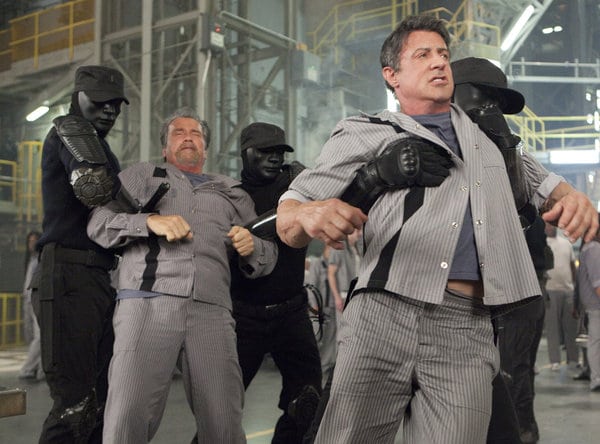
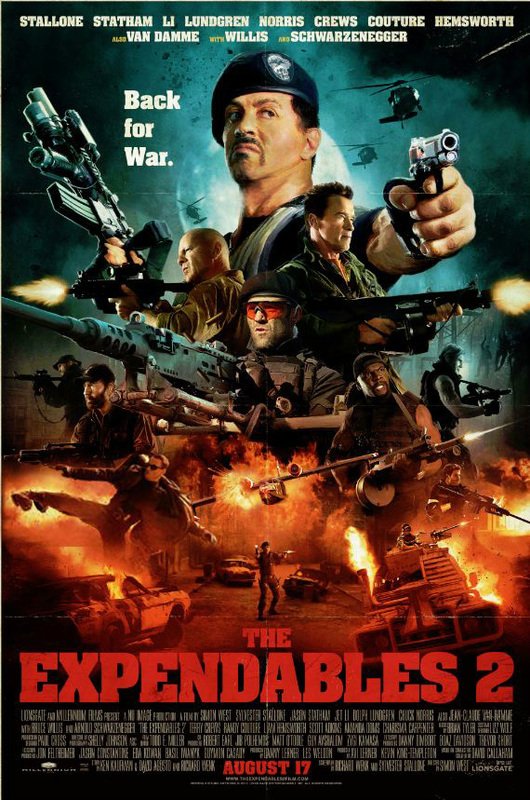
Be the first to comment